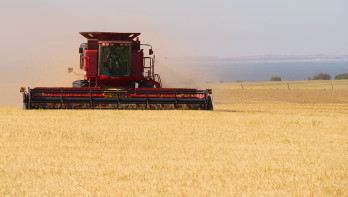Analysis Grains
Wheat is the weak link in the grain market
After a period in which the yield forecasts for wheat in Russia and Ukraine were only revised downwards, for a change, things are not getting worse. In Ukraine, the grain traders' association has strongly opposed the plans for minimum export prices. The association fears that this could seriously hinder exports. Biodiesel is becoming increasingly important for Brazilian soybean growers. There are limits to what the main importer, China, wants in terms of soybeans, according to the head of the Brazilian soybean processors.
The September contract on the Matif closed €3.25 lower at €226.55 per ton yesterday. Wheat on the CBoT closed 1.6% lower at $5.72¾ per bushel. Soybeans closed 1.6% lower, like wheat, at $11.55¼ per bushel. Corn took the hardest hit yesterday, closing 2.3% lower at $4.39¾ per bushel.
Wheat is the weak link in the grain complex. Export prices are under pressure, especially in Europe and the Black Sea region. In the US, the brisk start to the grain harvest has had a less positive effect on price development. Rain in Kansas has slowed down the harvest pace, but the state is still about ten days ahead of the multi-year average. The moderate sentiment in the wheat market is further reinforced by yield forecasts. Ikar has revised the wheat harvest expectation in Russia from 81.5 million tons to 82 million tons. In itself, this is not a shocking change, but after a period in which expectations were only revised downwards, this takes some getting used to.
Rapeseed on the rise?
Ukrainian grain exports in the 2023/24 season are nearly 2 million tons ahead of last season and, according to the latest update from the Ukrainian Ministry of Agriculture, stand at 49.3 million tons. In June, 2.3 million tons of grain have been exported so far, compared to 2.1 million tons in the same period last year. The price of rapeseed in Ukraine is expected to rise in the coming months. At least that's what the Ukrainian agricultural society predicts. The current price is around €425 per ton and is expected to rise to €500 in October. For growers who have not yet locked in rapeseed, the advice from the society is simply to wait and see.
The Ukrainian Grain Association UGA warns of the consequences of minimum grain export prices that the Ukrainian Ministry of Agriculture is considering. On the one hand, Ukraine wants to increase income related to the export of agricultural products, but is also not blind to the criticism from European farmers who believe they are facing unfair competition. As a solution, Ukraine has proposed and worked out minimum export prices for wheat, corn, soybeans, and rapeseed, among others. This could be implemented as early as August. The UGA is not happy with such a system. "It will have a very negative effect on exporters' ability to meet their obligations, undermine confidence in Ukrainian exporters, complicate the planning and financing of export activities, and at the same time reduce the competitiveness of Ukrainian goods in world markets," writes the UGA. According to the association, it could cost up to half of Ukrainian exports.
Diesel to the rescue for soybeans
Biodiesel is becoming increasingly important for the Brazilian soy sector, according to Andre Nassar, chairman of Abiove, a Brazilian interest group for soy processors. "I do not expect us here in Brazil to increase soybean cultivation by 1 million hectares annually to meet the demand from China," Nassar said to the journalists present at a fair. China is trying to become less dependent on imports, and the recent issues with export duties in Brazil are not helping exports. Nassar expects that the demand for soybeans from China will remain stable at around 100 million tons from various countries in the coming years. Brazil is currently the main soy supplier to China. Biodiesel is an important sector to absorb the extra soy production in Brazil.




